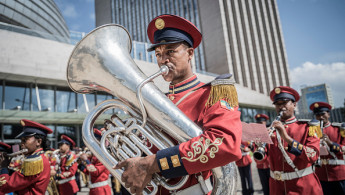Africa must not become 'geostrategic battleground' warns AU
Africa must not become a "geostrategic battleground" for global powers, as the continent grapples with several threats to its peace and security, African Union leaders warned Thursday.
They were speaking at an event to mark the anniversary of the creation of the AU's precursor, the Organisation of African Unity, on May 25, 1963.
"In this international context of confrontation of divergent political interests, the will of each side threatens to transform Africa into a geostrategic battleground, thereby creating a new Cold War," AU Commission chair Moussa Faki Mahamat said.
"In this zero-sum game, where the gains of others would translate into losses for Africa, we must resist all forms of instrumentalisation of our member states," he added in an address at AU headquarters in the Ethiopian capital Addis Ababa.
The continent has become the stage for a battle for influence among the major powers, which has redoubled since Russia's invasion of Ukraine 15 months ago.
Moscow is seeking deeper political, economic and military ties in Africa as well as Asia as Russia becomes increasingly isolated on the international stage over the conflict in Ukraine.
'Capacity for resilience'
In February, 22 AU member states abstained or did not vote on a UN General Assembly resolution that called for Russia withdraw from Ukraine.
Two of them - Eritrea and Mali - voted against the resolution.
Faki meanwhile also hailed the successes of the 54-nation AU which succeeded the OAU in 2002: "Independence and victory against apartheid, that of significant economic and scientific progress, sports, arts, the growing international role of Africa and so on."
However, he also acknowledged "negative factors such as democratic decline through unconstitutional changes of government, with their litany of oppression and gagging of freedoms, insecurity, the spread of terrorism, violent extremism, the uncontrolled circulation of arms, the harmful effects of climate change".
Despite the difficulties, Faki said, Africa remains "characterised by its greater capacity for resilience", pointing for example to its response to the Covid-19 pandemic.
The current head of the African Union, Comoros President Azali Assoumani also denounced "the unconstitutional changes of power" which have multiplied in Africa in recent years.
"Inter and intra-African conflicts but also terrorism persist and consequently the peace, security, democracy and development of our continent are threatened in several of our countries," he said.
Assoumani spoke of the conflict between rival generals in Sudan which erupted in mid-April and has persisted despite several truce agreements.
"We must convince our brothers in Sudan to favour dialogue so that the fratricidal war raging in this country ends," he added.





 Follow the Middle East's top stories in English at The New Arab on Google News
Follow the Middle East's top stories in English at The New Arab on Google News


